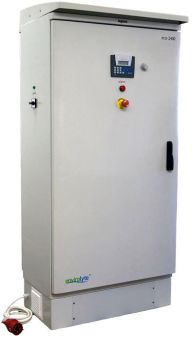|
|




|
 Visits counter
Visits counter
|
|
Visits today:
| 142 |
|
Visits yesterday:
| 305 |
|
Visits Week
| 825 |
|
Visits Month
| 6149 |
|
Visits Year
| 11881 |
|
Visits Total | 444104 |
|
|
Our Equipments

|
Envirolyte ECO-2400 |
|
|
|
-
Water
purification process in Envirolyte ECO units includes anodic
electrolytic oxidation with simultaneous removal of cations;
electrocatalytic and chemical additional oxidation in intermediate
vortical reactor tank and catalytic purification in catalytic reactor.
-
The
unit consists of a diaphragmatic electrochemical flow-through type
cell, a catalytic reactor, a vortical reaction chamber and a VDC power
source. The electrodes in the reactor have a special coating, which
includes oxide ruthenium, iridium, platinum and titanium. The
ultrafiltrating ceramic diaphragm made of zirconium, ittrium and
aluminium oxides is located between the anode and cathode chambers and
prevents the water in the anode and cathode chambers from mixing,
thereby providing ion migration in electric field between anode and
cathode. The design of diaphragmatic cells ensure the contact of all
microvolumes of water flowing through the anode or cathode electrode
chamber with an electrode surface, in the vicinity of which (in
so-called Double Electric Layer - DEL) the electric intensity reaches
100,000 to 10,000,000 V/cm. This ensures a high quality of electrolytic
and electrocatalytic water purification.
|
 |
|
|
-
Water
purified by Envirolyte ECO units acquires biocidic properties,
stimulates biological oxidation, can provide indirect electrochemical
detoxification of the human body through oxidation hydrolixilation of
uremic and other toxins.
-
In
the course of anode unipolar electrochemical treatment the water within
fractions of a second becomes saturated with highly active oxidants.
 Drawing of Envirolyte ECO operational principle
Drawing of Envirolyte ECO operational principle
|

Envirolyte ECO-2400 |
-
Processes
of direct electrolytic oxidation (on the electrode surface) and
electro-catalytic oxidation ensure the destruction of organic impurities
and the demolition of micro-organisms. End products of the total
oxidation of all organic matter (including phenols) are generally
harmless, mostly carbon dioxide and water.
-
Extremely
high oxidation-reduction potential of the water directly in the anode
chamber and meta-stable compounds of active chlorine and active oxygen
participating in the reactions prevent the formation of toxic
chlorine-organic substances and ensure total destruction of dioxins.
-
In the
catalytic reactor, hetero-phase catalytic destruction of active
chlorine compounds and heterophase catalytic oxidation of organic
substances is carried out on the surface of granules of a
replacement-free and regeneration-free catalyst, where active chlorine
compounds decay to form highly active short-lived particles. When
leaving the catalytic chamber, the water is saturated with oxygen and
practically does not contain active chlorine compounds.
|
|
|
|
|

|